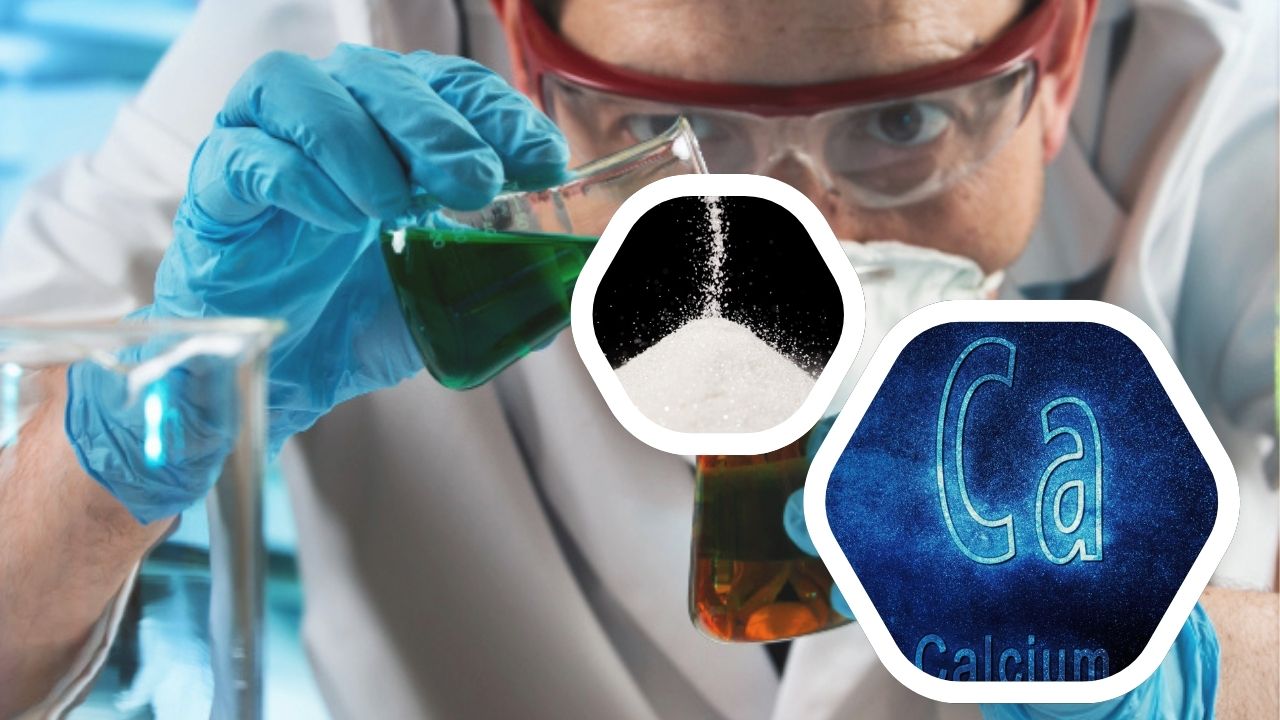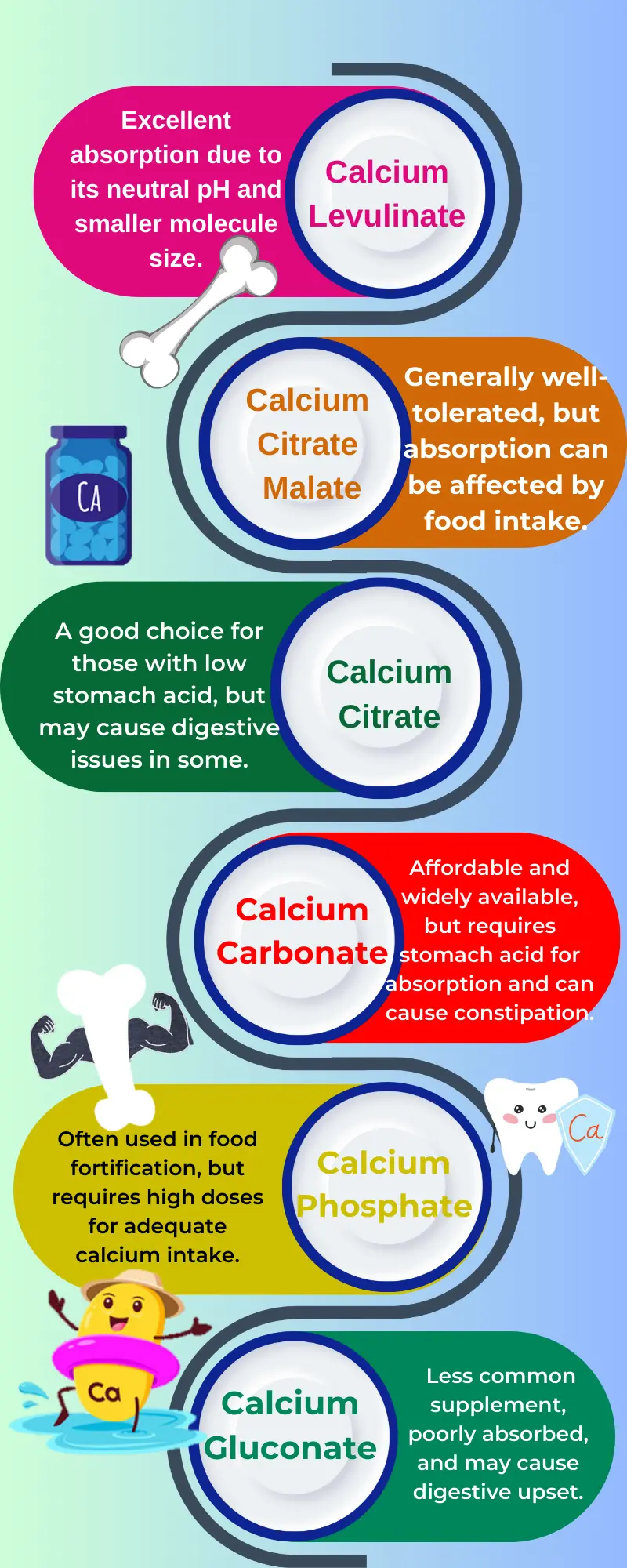Calcium Levulinate: A New Era in Bone Strength and Health
In the intricate dance of bodily functions, calcium emerges as a stalwart protagonist, fortifying the scaffolding of our bones and teeth. Yet, the modern dietary landscape often falls short of meeting our calcium demands, necessitating supplementation. Brace yourself as we embark on a journey into the realm of calcium levulinate, a fresh contender in the universe of calcium supplement!
Pharmaceutical grade Calcium Levulinate:
Picture calcium in tandem with levulinic acid, a botanical constituent found in an array of flora, including brown algae 1. This harmonious union results in calcium levulinate, a crystalline powder with a gentle touch on the stomach 2. Imagine your stomach as a tightly-orchestrated dance between acidity and digestion. A healthy stomach maintains a pH level between 1.5 and 3.5, acting like a powerful breakdown crew, crushing food and keeping bad bacteria at bay. Here’s where some calcium supplements can turn into unwelcome guests. They often have a different pH, acidic or alkaline, which disrupts the delicate stomach tango. This clash can irritate the lining, leading to a chorus of digestive woes – heartburn, indigestion, and constipation. But fear not, calcium levulinate behaves as a smooth operator. With a neutral pH (around 7), it seamlessly integrates with the stomach’s natural rhythm, minimizing disruption and keeping your digestive symphony flowing smoothly.

Peering into its Chemical Architecture:
Calcium levulinate’s structure offers a fascinating display. A single calcium ion (Ca2+), like a nimble ballroom partner, waltzing with two levulinate molecules (C4H7O3) 3. Each levulinate molecule, with its four carbon atoms and a captivating interplay of functional groups, offers a perfect counterpoint to the calcium’s positive charge. This graceful choreography results in a stable and balanced structure, Ca(C4H7O3)2, where the calcium and levulinate exist in a delicate equilibrium 4 5 6. This very structure is what contributes to calcium levulinate’s unique properties, making it a gentler and more bioavailable form of calcium for our bodies.
Expanding Horizons: Calcium fortification in food
While fortifying skeletal fortitude remains paramount, emerging research hints at the multifaceted potential of calcium levulinate:
- Fortification Frontiers: The fight against calcium deficiency often involves food fortification, but some calcium sources can be disruptive. They might leave a bitter aftertaste in your favorite beverage or alter the texture of your go-to condiments. This is where calcium levulinate steps in as a stealthy warrior. Unlike its counterparts, it boasts a neutral taste profile, blending seamlessly into various foods without compromising their deliciousness. This makes it a versatile hero, perfect for fortifying a wide range of everyday essentials.But calcium levulinate’s strength goes beyond taste. It also possesses remarkable stability. Unlike some calcium sources that degrade over time or react poorly with certain ingredients, calcium levulinate remains a reliable soldier. It maintains its integrity throughout a product’s shelf life, ensuring consistent calcium delivery with every bite or sip.
This stability and neutral taste profile make calcium levulinate a beacon of hope in the fight for strong bones. It empowers manufacturers to silently enrich everyday staples like beverages, condiments, and even soy products with a reliable source of calcium. This “silent enrichment” empowers consumers, especially those who struggle to meet their calcium needs through diet alone.
Calcium levulinate boasts exceptional bioavailability. This means your body can readily absorb a high percentage – around 90% – of the calcium it contains.
Uses of calcium levulinate:
There are numerous health benefits of calcium levulinate to be noted:
- Growing children and adolescents: Supports bone development during crucial growth phases.
- Postmenopausal women: May help maintain bone density and reduce risk of osteoporosis.
- Lactose intolerant individuals: Provides a reliable calcium source for those who avoid dairy products.
- People with low stomach acid: Neutral pH allows for easier absorption compared to some calcium supplements.
- Individuals on vegan or vegetarian diets: Helps ensure adequate calcium intake when dietary sources are limited.
- Adults at risk for osteoporosis: May play a role in preventing bone loss and fractures.
- Calcium levulinate injection: It is a pharmaceutical preparation used to treat calcium deficiencies or disorders that require a rapid increase in calcium levels.

Safety and Accessibility Considerations:
Initial appraisals underscore the benign nature of calcium levulinate, with reports indicating commendable tolerability and absence of toxicity. Initial appraisals underscore the benign nature of calcium levulinate, with reports indicating commendable tolerability and absence of toxicity. Nevertheless, as with any supplementation regimen, seeking counsel from healthcare practitioners assumes paramount importance 9. While calcium levulinate currently occupies a niche in the supplementation sphere, the tide of research and burgeoning interest may herald broader accessibility in the foreseeable future.

Calcium Levulinate and side effects
Some may experience nausea, vomiting, or constipation as common side effects.
Pain, redness, or swelling at the site of the injection can occur.
Long-term use or high doses can increase the risk of developing kidney stones due to elevated calcium levels.
Comparative Uses and Benefits of Various Calcium Compounds
Calcium Levulinate vs. Calcium Gluconate: Calcium levulinate offers higher solubility and better absorption compared to calcium gluconate.
Calcium Folinate vs. Calcium Levofolinate: Calcium levofolinate is the active form of folinic acid, making it more bioavailable than calcium folinate.
Calcium Ammonium Nitrate vs. Calcium Levofolinate: Calcium ammonium nitrate is primarily used as a fertilizer, whereas calcium levofolinate is a medication used in chemotherapy.
Calcium Carbonate vs. Calcium Levofolinate: Calcium carbonate is commonly used as an antacid and dietary supplement, while calcium levofolinate is used to reduce toxic effects of certain chemotherapeutic agents.
Calcium Hydroxide vs. Calcium Levofolinate: Calcium hydroxide is used in industrial applications and dental procedures, whereas calcium levofolinate is a pharmaceutical agent used in cancer treatment.
Conclusion:
This exploration of calcium levulinate has unveiled its potential as a promising contender in the monarchy of calcium supplements. Its gentle nature on the digestive system, coupled with its versatility for fortification and ongoing research, paints a captivating picture for the future. However, as with any new supplement, consulting a healthcare professional before embarking on this path is paramount 10. This discourse has merely opened the door to the possibilities of calcium levulinate.
As scientific inquiry continues its relentless march, we can anticipate witnessing its rise as a pivotal player in the pursuit of holistic health and well-being. The future of calcium supplementation might just hold the key to stronger bones and a healthier you, and calcium levulinate stands poised to be a major force in this exciting journey.
-
Calcium levulinate, DRUGBANKonline https://go.drugbank.com/drugs/DB138000
-
National Center for Biotechnology Information. PubChem Compound Summary for CID 11578, Calcium levulinate. Accessed June 1, 2024. https://pubchem.ncbi.nlm.nih.gov/compound/Calcium-levulinate
-
Xue Baoqi, X. and Shuqi,W. (2000). Preparing process and application of calcium levulinate (Chinese patent No. CN1111150C). https://patents.google.com/patent/CN1111150C/en
-
Xue Baoqi, X. and Shuqi,W. (2000). Preparing process and application of calcium levulinate. (Chinese patent No. CN1304923A). https://patents.google.com/patent/CN1304923A/en
-
Sharath, B. O., Tiwari, R., Mal, S. S., & Dutta, S. (2019). Straightforward synthesis of calcium levulinate from biomass-derived levulinic acid and calcium carbonate in egg-shells. Materials Today: Proceedings, 17, 77-84. https://www.sciencedirect.com/science/article/abs/pii/S2214785319317730#:~:text=The%20reaction%20was%20optimized%20on,CL%20as%20a%20crystalline%20solid.
-
“Calcium levulinate.” Merriam-Webster.com Medical Dictionary, Merriam-Webster, https://www.merriam-webster.com/medical/calcium%20levulinate. Accessed 1 Jun. 2024, https://www.merriam-webster.com/medical/calcium%20levulinate#citations
-
Amarasekara AS, Sterling-Wells DT, Ordonez C, Ohoueu MJ, Fonari MS. Crystal structure of a polymeric calcium levulinate dihydrate: catena-poly[[di-aqua-calcium]-bis-(μ2-4-oxo-butano-ato)]. Acta Crystallogr E Crystallogr Commun. 2015 Apr 18;71(Pt 5):494-7. https://www.ncbi.nlm.nih.gov/pmc/articles/PMC4420067/
-
CALCIUM LEVULINATE ANHYDROUS, National centre for Advancing translational Sciences, LLQ966USIL, US Approved OTC, First marketed in 1921. https://drugs.ncats.io/drug/LLQ966USIL
-
Cox, G.J., Dodds, M.L. and Clasper, C. (1934), The solubility of calcium levulinate in water. J. Pharm. Sci., 23: 662-664. https://doi.org/10.1002/jps.3080230704
-
Cox, G. J. and Dodds, M. L. (1934), Manufacture of calcium levulinate. (U.S. Patent US2033909A). https://patents.google.com/patent/US2033909A/en
Calcium Levulinate is used to treat calcium deficiencies and associated conditions such as hypocalcemia and osteoporosis.
Calcium Levulinate is administered orally in tablet form or intravenously.
Calcium Levulinate offers higher solubility and better absorption compared to other calcium supplements.
Side effects may include gastrointestinal issues, hypercalcemia, injection site reactions, kidney stones, and allergic reactions.
The recommended dosage varies based on the condition being treated and the patient’s needs, typically prescribed by a healthcare professional.
Yes, Calcium Levulinate can be used in veterinary medicine to treat calcium deficiencies in animals.
Calcium Levulinate should be stored in a cool, dry place away from direct sunlight and moisture.
Calcium Levulinate may interact with certain medications, such as antibiotics and bisphosphonates, affecting their absorption and efficacy.
Yes, Calcium Levulinate is generally safe for long-term use when taken as prescribed by a healthcare provider.
Calcium Levulinate is available in tablets, powder, and injectable forms.

